I have three kids.

Before I had three kids, three didn’t seem like very many. Grandma had four. My other grandma had ten. My GREAT-grandma had 14. I was really shooting for five, but ironic life and stupid divorce cut my plan short.
I topped out at three.
Three still doesn’t seem like that many, but it’s getting harder all the time. They’re getting bigger and busier, and the sacrifices required by me as a parent to raise good kids are getting… harder. DEEPER. Different. Whereas before the biggest sacrifice was colicky lack of sleep and throw up on my shirt, it’s now worry lack of sleep, and a schedule so full I am never, ever caught up.
Old Me: “Bitch please, I can do three and still get sleep. Hold my coffee, WATCH THIS.”
Me Right Now (while eye-popping, white-knuckle gripping my fourth coffee of the day): “HAHAHAHAHAHA… wait, remember when they were babies and you didn’t have a job, and you thought you were busy?! THAT WAS HILIARIOUS. HAHAHAHAHAHA!!!”
It was with glorious, beautiful, brutal, gut-wrenching agonizing joy that I finally realized life is never going to slow down, and this job is only going to get harder. The understanding was painful but so, so important.
Only when you realize that you’re running out of time can you begin grasp the gravity of being a parent.
Me to Other Me: “You get one shot at this, so make it good. Make it count.“
…no pressure or anything.
Before I had my first kid, I spent some time thinking about being a parent.
[…ok, “some time” is a gross understatement. I OCDed the shit out of parenting and read fifteen books in two months, plus took classes.]
I thought about what I wanted my kids to learn. What I wanted to teach them. What lesson, when they were grown and moved along and fully functioning adults themselves, would echo in their head like a whispery, creepy stalker because I had repeatedly crammed it in their ears throughout childhood.
Truthfulness.
Integrity.
Kindness.
Empathy.
Curiosity.
Creativity.
A passion for learning, a love for reading, and a killer work ethic.
As I write this now, I realize that I didn’t do too bad of a job. Most of the things on this list my kids have in spades. Having a goal ahead of time helped, and it was executed well. …plus the raw material I had to work with was pretty great.
(I also realize that patience, something the youngest kid has zero of, is not on that list. OOPS and my bad, adding it now and dragging it front and center.)
There was one more thing NOT on the list that I didn’t think of until I had my daughter, looked in her tiny face the first night she was born, and thought, “….holy shit. Now what.”
I had no idea how to talk to my kids, or how to get them to talk to me.
Communication with my kids wasn’t so much a lesson I had to teach, but a culture I had to grow. As I considered raising a child and growing an adult and “what kind of mom do you want to be,” I knew that I was going to have to get my kids to talk to me.
“How the heck do I get my kids to TALK TO ME?”
We started small. I took ASL (sign language) classes online. There’s a great website online that teaches one sign at a time (complete with gif videos), and I used the crap out of it. I started signing to my babies at age 3 months, and got my first signs back from them around 7 months.
To get them to talk, *I* talked. A LOT. I talked to them all the time, like they were grown people. I talked to them at the grocery store, at the doctor, at home, while bathing, changing, feeding. When adults would ask me about my kids, I would look at my kids and repeat the question, then answer. They were intentionally included in every appropriate conversation from day one.
They grew and started to reciprocate. “Making noise” was always encouraged, because in the beginning that’s all they could do. Eventually the noise became words, and the words expressed thought.
As they grew, the topic of conversation changed. They turned two and started asking questions. SO MANY QUESTIONS OMG WHY, but I answered them all. I never wanted to risk that I’d put them off one time (“I already answered that question, go away”) and they’d never ask again, or they’d think twice about coming to me with a curiosity. (Plus, “curiosity is one of my goals for them,” I reminded myself after the fifteen-hundredth time talking about bugs and worms and poop.) We talked about everything. ERRR.THANG.
It was once said to me, “To small people, the small things ARE big things,” and we have to teach our kids that we’ll listen to whatever they feel is important, every time. When the kids grow and ‘small things’ aren’t so small anymore, they’ll already trust us to receive and handle their thoughts with respect, patience, support, and love.
When my oldest kid hit five, in the dark part of divorce, she started asking questions about her family. Our divorce, her circumstances. I didn’t say, “None of your business;” what I said was, “He made some choices and I made some choices, and we know it’s best if we aren’t married anymore. Ask me again when you’re sixteen and I’ll give you the rest.”
And I WILL tell her the rest. All of it, in as much gory detail as she needs.
They say that (if you’re lucky) kids will do 50% of what you tell them, but almost 100% of what you SHOW THEM.
I realized early on that to create a culture of communication in our home, I had to take the lead. I have to talk, too.
…scary, right?
**feels convicted**
**puts away junk food**
**starts swear jar**
I had to show them how to communicate. I had to, and have to every day, show them that talking and sharing is TANTAMOUNT to truthfulness, integrity, and creativity, and listening is vital to kindness, empathy, and curiosity.
I had to teach my kids how to be vulnerable (because really, that’s what communication is all about), which meant I had to learn HOW to be vulnerable.
Introverted me: [“…shit.”]
And so we communicate. Every day I ask questions. Every day we talk. We work on communicating in a positive, productive, constructive way, to build a relationship that will exist even after I’m dead and gone.
Without communication, there is no “us.” There is only me and them, living two lives separately in the same space.
I did not want that.
I GREW UP LIKE THAT, and I didn’t want it for my kids.
As a child, I didn’t talk to my parents. I suppose they probably wanted me to, but I didn’t. I’m sure it was my codependent tendencies that kept me silent – I told them all the things I did well because I knew they would be happy, but none of the bad stuff that I actually could have used some help with, for fear of disappointing.
Now that my kids are older (8, 9, 11), I’m quite sure that my desire for talkative kids is mostly selfish, but I also know it’s even more important than ever. When they were two they didn’t shut up (seriously, so many questions), but they also didn’t SAY anything. Words, yes. Words meaningful to me, no.
As they grow, the depth and truth and significance of their thoughts grow too, and now I really, REALLY want to hear what they have to say. When they open the door to their minds and hearts to step out into the world, bad stuff will inevitably creep in behind them, slithering into the safe space I’ve worked so hard to protect all these years.
I want them to come back to that safe space and bring to me all the troubles they find, so we can work through them together.
It is one of parenting’s great ironies that the more our kids have to say, the less they tend to, and the more we want them to share.
My daughter turned 11 last October. She proudly self-identifies as “eleven-teen,” and holy crap is that accurate. In a lot of ways she’s like her mom, silent and introverted, unwilling to share and resisitant to vulnerability. It has always been a challenge to get her to visit with me about anything important, because (as she puts it), “I don’t like talking about my feelings.”
…but oh my dear, feelings are almost all that matter, because they are the fruit of your heart.
For the most part, I know how my kids’ heads work. When they are presented with a situation in which they need to make a decision, I can predict with almost 100% accuracy what they’ll choose. I’m sure that comes from all the talking; we do a lot of “overthinking” in our house, and have a lot of hypothetical discussions.
Thoughts I understand.
Feelings… sometimes their feelings surprise me.
To understand how my kids feel, to REALLY UNDERSTAND THEIR HEARTS, they have to be willing to share them with me. Depth, the entire point of this website and business endeavor, is the constant seeking of that understanding of those around us, and of ourselves.
One of the deepest, purest desires of my heart is to know my children better than any other human will ever know them, not because I feel I need first place in their hearts or to manipulate their future selves, but because I am their mother. There exists no other honor greater in the world than bringing life and growing human beings, and I want to do it as hard as I can.
As BEST I can.
So how. How do I encourage my 11 year old, very artistic, very introverted girl who loves to write, to share her life with me?
Through art and script, of course.

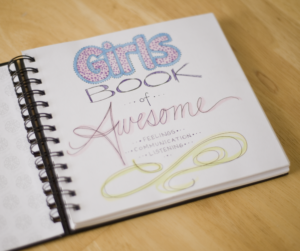
…because girls ARE awesome.
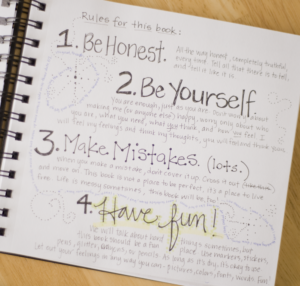
In her 10th year, I started a journal with Norah. It’s a scrapbook-chain-letter-diary of sorts, where we tell each other all the things we’re (she’s) too uncomfortable to say out loud. At the start there was some reluctance to the project, she held back a bit and was not entirely committed to the process, but it’s grown on her.
I lead by example and add stories, some completely irrelevant to our personal lives but loaded with moral messages. I draw pictures, add color, use stickers and markers, and when life hands her awesome things to remember, I stick pictures and newspaper clippings and ticket stubs in the book, too.
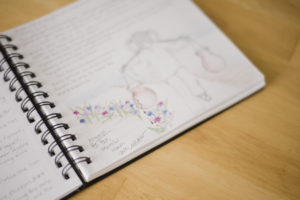
When I see her struggling with things she’s unwilling to share, I ask questions in the book. I do not force her to talk about anything in particular, but I always ask. I also encourage her and tell her stories of my own childhood, in the hopes that she understands “this too shall pass.”
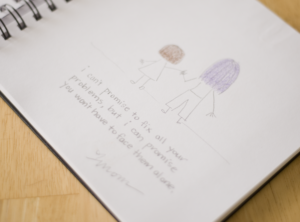
In our book, I use every tool at my disposal to create a resource for her to use later. My hope is that she will hold this book close, and someday down the road she will look at it, flip through it, and reread something that suddenly makes 100%, complete sense, even though at the time it was written it was “just a note from Mom.”
I believe the true meaning of Legacy is found in the faces of our children. They are the only thing we’ll ever do that truly matters, the only work that ever pays off, the only thing we can take with us, the only thing of value we’ll leave behind. Raising children is the only action that echoes through eternity, and it makes sense to me that the endeavor of parenthood is prioritized accordingly.
First. And HARD.
Since my daughter and I started our book, my boys have jumped on board. We have books together, too.

The books I share with my boys are not as neat and tidy, and they tend to talk about WAY different things, but that’s good. My kids are all really different, so their books will be different. My words are for each of them individually, and hopefully the stories I tell and the questions I ask will lead them home over and over again, back to that safe place I’ve worked so hard to build inside their hearts and minds.
Plus, every once in a while, the kids put things in their books that build ME up, too.
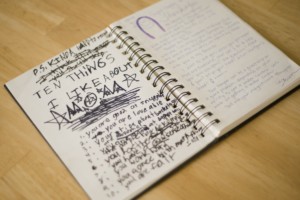
“#4 – The purple hair is killing it.”
To get started on your own books with your kids, here’s what you’ll need:
A sketchbook, preferably one with spiral binding (so it will expand easily as you add things), with heavy, multi-media paper and at least 60 pages. I tried a few different shapes and sizes, and I found that smaller (5 x 7 or 5.5 x 8.5) is easiest for small kids. Too big makes the job harder, and filling a large page can be intimidating at the start. If it is perforated at the edge, be sure the perforation is small and fine and not easily torn without intent.
Pens, markers, stickers, glue sticks, glitter, washi tape, and a very active imagination. Use whatever inspires you, and allow your kids to do the same. Art has a way of opening us up, and sometimes when the words won’t flow, pictures do.
ZERO EXPECTATIONS and ONE HUNDRED PERCENT ACCEPTANCE. Walk into this completely open to whatever they give you, however they say it. If you’re expecting your kid to write a five page soliloquy expressing the deepest, most passionate desires of her heart, you’ll be disappointed. The object of this exercise isn’t to get from them what you need, but happily accept everything they’re willing to give you.
Encouragement for their participation. I don’t require my kids to write anything in particular in their books, but I do require that they write in them. About once a week during study table time (homework time set aside after school), I add “Journals” to the homework list. They are almost always glad to do it (because stickers and markers, duh), so it isn’t a punishment, but it is a commitment. Just like creating a culture of communication is a commitment. Right now they don’t understand why it’s important that we do this, but they will. Later, they will.
Time set aside every week (and sometimes more often) to write back. This is the hard part for me… I have a tough time even remembering to pee, so making time to write in their journals is hard. They help me with it by setting their journals on my desk or bedside table when they’ve made an entry, so I know I have some reading and writing to do. It’s become a fun thing for us, sharing thoughts and jokes and stories and drawings.
I volunteer a lot at my kids’ school, and I often (humbly) hear from teachers and other students how great my kids are.
I always agree.
“Yeah, they’re pretty great people.”
They are great people. I know that, and I’m sure that they’re such great people, they’d be great even if I wasn’t around.
It’s an awesome thing to know, though, that they’re great WITH me, and they’re great BECAUSE of me, and they’re also mine. I get to share part of their lives, and we do it every day through communication and effort.
Sometimes I lay in bed at night and think about my grown kids, what they’ll be like, what their adult lives will be like. I imagine them out at a party or at dinner with friends, laughing and smiling and enjoying the company of those around them. I feel a twinge of jealousy, knowing that at some point down the line I won’t be there, an envy of those who will stand by my kids’ sides as they navigate later life. I grieve that won’t get to see the end of their life, because I’ll already be gone and waiting for them on the other side.
…then I turn to my bedside table and see stacks of journals there filled with kid-size stories, and I know I’ll still be there.
I pour my heart into my kids and their books, so I will always be there.

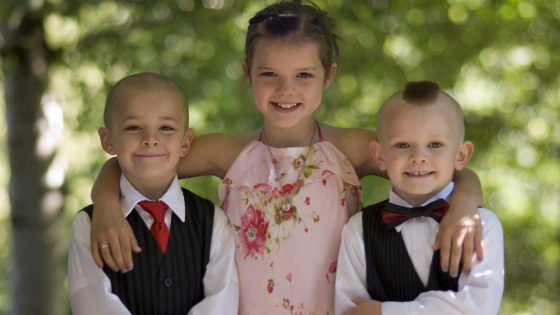










Comments ( 0 )